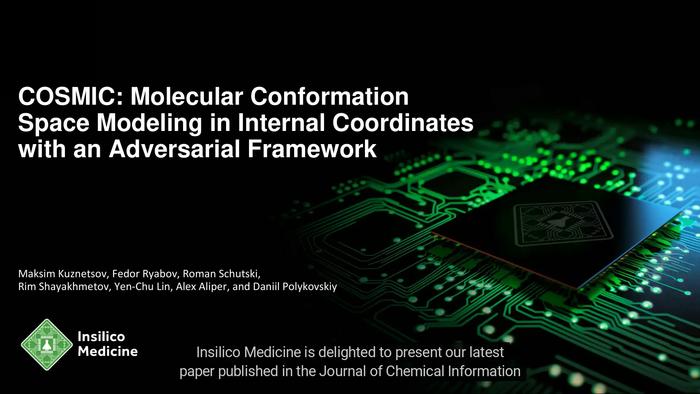While artificial intelligence (AI)-driven drug design has made enormous advances in recent years, much of the current technology still relies on 2D structural representation of molecules. But 2D structures can’t provide key information about how atoms are arranged in space – otherwise known as conformation. Only in 3D can researchers fully understand a molecule’s docking poses and binding energy and design a molecule with the specific shape needed to inhibit a particular protein and work as a drug.

Credit: Insilico Medicine
While artificial intelligence (AI)-driven drug design has made enormous advances in recent years, much of the current technology still relies on 2D structural representation of molecules. But 2D structures can’t provide key information about how atoms are arranged in space – otherwise known as conformation. Only in 3D can researchers fully understand a molecule’s docking poses and binding energy and design a molecule with the specific shape needed to inhibit a particular protein and work as a drug.
Now, researchers at Insilico Medicine, a clinical stage AI-driven drug discovery company, have developed a new adversarial generative framework for molecular conformation space modeling called COSMIC (molecular conformation space modeling in internal coordinates) that can provide important insights into the 3D positioning and activity of molecules to help drive decisions about drug design. Just published in the Journal of Chemical Information and Modeling, COSMIC provides accurate conformation space modeling more quickly than recent state-of-the-art diffusion models. The framework relies on a two-step process that involves constructing a conformation through internal coordinates and then predicting the distances between neighboring atoms to quickly refine the initial conformation.
COSMIC also introduces a new energy-based metric called RED (Relative Energy Difference) which evaluates the physical plausibility of generated conformations by accounting for conformation energy. This metric allows for large-scale, quantitative comparisons of energetic performance.
“In order to predict how drug candidates will work, we need accurate conformation generation,” says lead researcher Maksim Kuznetsov, PhD, senior research scientist at Insilico Medicine. “This, in turn, will further improve the capabilities of our AI drug discovery platform.”
Insilico Medicine has an end-to-end generative AI drug discovery platform, Pharma.AI, that includes small molecule generation via Chemistry42 – a customizable and fully automated software platform that integrates generative AI algorithms with computational and medicinal chemistry methods to generate novel molecules with drug-like properties. Chemistry42 uses over 40 generative models, including generative autoencoders and generative adversarial networks as well as both structure-based and ligand-based drug design to generate and optimize de novo small molecules.
The researchers performed extensive experiments to validate the COSMIC framework against other baselines around features such as data splits, sampling speed, and comprehensive validation processes. They found that COSMIC achieved comparable results to current state-of-the-art approaches, with superior speed, and worked on par with RDKit – the open source toolkit for cheminformatics – regarding distribution coverage and conformation plausibility.
“We are encouraged by the performance of COSMIC in these initial experiments and believe it will prove to be an important additional tool in accelerating and improving AI-based molecular modeling,” says researcher Daniil Polykovskiy, PhD, Senior Director of Technology at Insilico Medicine.
Insilico Medicine is a pioneer in utilizing generative AI for drug discovery and development, and has delivered breakthroughs for healthcare in multiple disease areas, including fibrosis, cancer, immunology and aging-related diseases. Since 2021, Insilico has nominated 18 preclinical candidates in its comprehensive portfolio of over 30 assets and has advanced six pipelines to the clinical stage. Most recently, the company published a history of its lead AI-discovered and AI-designed drug for idiopathic pulmonary fibrosis, currently in Phase II clinical trials, in Nature Biotechnology.
About Insilico Medicine
Insilico Medicine, a global clinical-stage biotechnology company powered by generative AI, connects biology, chemistry, and clinical trial analysis using next-generation AI systems. The company has developed AI platforms that utilize deep generative models, reinforcement learning, transformers, and other modern machine learning techniques for novel target discovery and generating novel molecular structures with desired properties. Insilico Medicine is developing breakthrough solutions to discover and develop innovative drugs for cancer, fibrosis, immunity, central nervous system diseases, infectious diseases, autoimmune diseases, and aging-related diseases. www.insilico.com
Journal
Journal of Chemical Information and Modeling
DOI
10.1021/acs.jcim.3c00989
Article Title
COSMIC: Molecular Conformation Space Modeling in Internal Coordinates with an Adversarial Framework
Article Publication Date
26-Apr-2024




